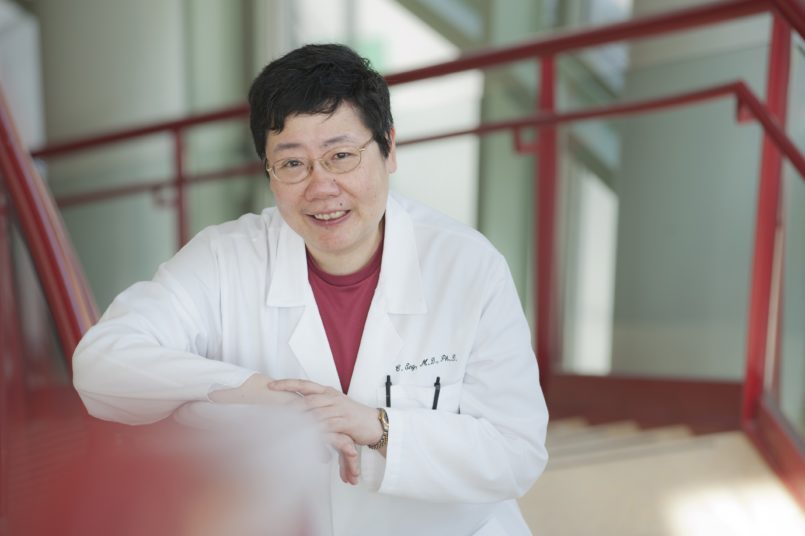Used as a quick triaging tool, chatbots have identified a percentage of patients for referring to an in-person genetic counselor for genetic testing.
Approximately 10 percent of all cancers are due to an inherited cause, according to the National Cancer Institute, meaning that about 12 million people living in the United States carry a gene, which when mutated, predisposes them to cancer.
“It’s more aggressive than your run-of-the-mill cancer,” says Charis Eng, MD, PhD, chair and founding director of the Genomic Medicine Institute of the Cleveland Clinic. In addition, heritable cancers tend to strike earlier in life than their non-inherited counterparts, and often with multiple malignancies, such as bilateral cancers in paired organs. Such genes also have a 50 percent chance of being passed onto offspring and carry a dramatically higher risk for cancer than in the general population. For example, an individual carrying BRCA1 or BRCA2 mutation faces an up to 85 percent lifetime risk of breast cancer, compared with 13 percent of the general population.

Charis Eng, MD, PhD (above), Chair of Cleveland Clinic’s Genomic Medicine Institute, received the American Cancer Society’s Medal of Honor in 2018. An internationally recognized physician-scientist in the cancer genetics field, Eng was among five honorees to receive the organization’s highest award at a ceremony in Washington, DC. (Photo copyright: Cleveland Clinic)
Precision oncology has the capability to identify those predisposed to such cancers and monitor them early and often to boost the odds of early detection and curative treatment.
Finding the Tenth at Risk
A popular, albeit controversial, school of thought is to sequence every individual’s DNA to identify predispositions for heritable cancers and other types of genetic disease. Right now, Eng says that proposition is neither cost-effective nor practical. “The denominator is so large, and you’re looking for a small numerator,” Eng says. Further, she asks (rhetorically), “Do we have the manpower to interpret zillions of sequences from 7.3 billion people worldwide?”
A simple method for selecting people who should have genetic testing, Eng says, is to conduct a family history that will reveal clinical red flags, such as young age of onset, two or more cancers in a single person, and other indicators that might signify the potential of having hereditary cancers.
The current standard of care, Eng says, is for patients to receive genetic counseling both before genetic testing as well as after the results come in. It’s also important to note that some third-party payers require genetic-counseling sign-off before they will reimburse for testing.
Why Telegenetics and AI Now: Stretching Resources
One reason for exploring telegenetics is a continuing challenge for healthcare organizations: Demand for qualified clinical geneticists and genetic counselors far outstrips supply. While the Cleveland Clinic now employs 20 genetic counselors and 11 physician geneticists, they don’t all work within the health system’s campus.
“We have been hiring physicians, whom we know and trust, but who live elsewhere,” Eng says. Through the use of telehealth portals, these physicians can work remotely with patients in the Cleveland area and beyond.
And this past spring, the Cleveland Clinic became one of the first systems in the country to leverage artificial intelligence (AI), in the form of chatbots, to provide the most algorithmic forms of genetic counseling.
The goal of chatbots is not to replace genetic counselors but to delegate important tasks that are repetitive, time-consuming, and scriptable, to leave genetic counselors more time for more valuable and highly skilled patient care, notes Tara Schmidlen and Amy Curry Sturm, writing for BioNews 1.
For the Cleveland Clinic, “the chatbots do not give care, but they give genetics education,” Eng says. The bots communicate with patients in a format similar to text messaging, she adds. For example, the bot will ask the patient, “Do you remember your relative telling you I will be ‘talking’ to you?” If the person responds affirmatively, the next question will be, “Do you want to know more about your mother’s [or father’s] gene mutation?” At any time, the patient can, with the click of a button, request to talk with a human genetic counselor, Eng notes.
So far, the chatbots have been rolled out in the Cleveland Clinic’s colonoscopy clinic. The bots do more than just educate patients about colonoscopies, they also ask questions that can detect clinical red flags.
“It’s a quick triaging tool,” Eng says. “In the first three weeks, there seems to have been a lot of acceptance. Approximately 8 percent of the patients who have used the bots have been found ‘positive’ and who would be referred for [in person] genetic counseling and genetic testing.”
—Debra A. Shute
Related Information:
Charis Eng, MD, PhD, Receives Medal of Honor from American Cancer Society
The Role of Family History at the Cleveland Clinic
About the Cleveland Clinic’s Center for Clinical Artificial Intelligence
How Chatbots Will Make Genetic Counseling Services More Accessible
